eNews Spring 2023
Spring 2023...in this issue:
- We’re working hard to improve the EnableNSW Online user experience
- New and improved Equipment Request Forms are now live
- A temporary pathway for people with an immediate health need
- A deep dive into some of the changes we’ve introduced in 2023
- Face-to-face prescriber education sessions returning in 2024
- Invitation to join one of our technical working groups
- Patient satisfaction with the IPTAAS at an all-time high
- Going circular means helping more people
- The Equipment Loan Pool project: a strategic success
We’re working hard to improve the EnableNSW Online user experience
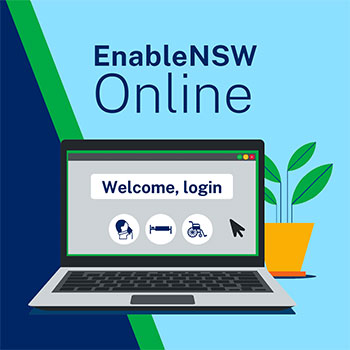
The EnableNSW team would like to extend a heartfelt thank you to all NSW Health clinicians who have accessed their EnableNSW Online account since 31 July 2023 and provided their feedback about their user experience. This feedback has been invaluable, driving continuous improvements and shaping enhancements to the existing system, including:
- introducing a background timer to prompt clinicians to regularly save their application,
- the implementation of a save button to ensure clinicians don’t lose their work on a particular page of the application. This is especially important for clinicians who may need to leave their application, while their computer is idle.
- a red box appearing when a question has been missed, and
- clearance items are now more visible in the catalogue.
‘Since go live, there have been reported incidents by clinicians that have allowed us to make real time improvements to the system, and this in turn has enhanced the overall user experience. Please continue to send these through as regularly as you can,’ said Jackie Hiller, Manager EnableNSW.
While the system can only be accessed by NSW Health clinicians at this stage, it is encouraging to see clinicians outside of the NSW Health network reference the EnableNSW equipment catalogue to help complete the Equipment Request Forms (ERFs). The EnableNSW equipment catalogue currently hosts over 20,000 items and has clear descriptions of available products, images, and good filtering capabilities. It will continue to be updated over time.
The user authentication and privacy issues that have prevented private clinicians from accessing EnableNSW Online are continuing to be investigated. The privacy of all clinicians and their patients is of critical importance, including equitable access to the system, which is why this work will remain a priority for the team.
New and improved Equipment Request Forms are now live

Following months of revisions, we are pleased to announce the newly updated Equipment Request Forms (ERFs) are now live and ready for use. With a clearer layout, more tick boxes and aligned to the relevant funding criteria, clinicians have already provided positive feedback about the new look and feel. The EnableNSW website forms and funding criteria page has also been updated to allow for a better browsing experience.
‘Over the past few months, we have sent targeted communication to clinicians about these changes, focusing specifically on the equipment category they usually prescribe in. Some clinicians may have received more than one email and we appreciate the time taken to read each of these emails.’ said Jemma Burns, Acting EnableNSW Clinical Manager.
‘We encourage clinicians to continue contacting our team and sharing their feedback. While these forms are final for now, there is still room for future improvements. This includes accessibility updates that will ensure all forms meet the NSW Government accessibility guidelines and all users can easily complete the forms, regardless of their abilities’.
Clinicians will be given the rest of 2023 to familiarise themselves with the new ERFs and adjust their local processes before a mandate to use the new ERFs is introduced in early 2024.
‘While we continue to receive a mixture of new and previous ERFs, we have made the decision to mandate clinicians to use the new ERFs early in 2024. We are collecting some new information and where possible, we want to avoid any requests going on hold. We will provide more updates about this change closer to the time,’ said Jemma.
‘We understand this may cause temporary disruptions to some clinical services and their local processes, and we will continue to work collaboratively with any clinical service who needs additional support during this time of change’.
A temporary pathway for people with an immediate health need
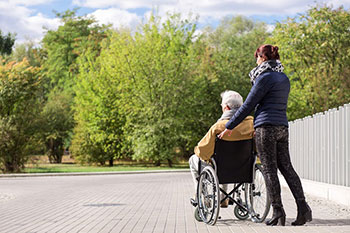
Since its implementation in 2018, the temporary Consideration of Exceptional Circumstances (COEC) pathway, has helped many people access loan equipment or provided a one-off supply of consumable products, where an immediate health need has prevented them from waiting for their long-term funding source.
In exceptional circumstances, discretion may be exercised by the EnableNSW Manager to approve an application that otherwise does not meet the eligibility criteria for accessing supports through EnableNSW.
‘COEC has proven to be a valuable pathway for clinicians who are navigating complex options for their patients, particularly where their health situation has changed quite rapidly. The requests we see are often to keep people safe in their own home and minimise the possibility of a hospital admission’ said Jackie Hiller, EnableNSW manager
Clinicians are reminded to check the information on the EnableNSW website before considering COEC, as well as making contact with the team to determine if this pathway is right for the person’s situation.
The general COEC criteria specifies that the request must demonstrate:
- the person does not meet the usual EnableNSW eligibility guidelines, and
- there is an immediate and acute health need and that access to EnableNSW services can:
- prevent an unplanned hospital admission i.e due to infection, cellulitis, urinary tract infection (UTI)
- support a timely discharge from hospital
- prevent further falls within the home
- manage an acute/new pressure injury
- the person does not have access to other funding support i.e they are on a waitlist for a NSW Government Home Care package and they have escalated appropriately to the Australian Government My Aged Care or their service provider.
All COEC requests are assessed on a case-by-case basis, and subject to available funds.
A deep dive into some of the changes we’ve introduced in 2023
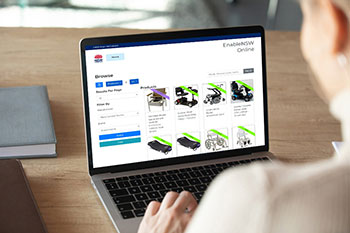
Over 550 clinicians from across NSW Health and the private sector have registered for a clinical education session to learn more about the changes that have been introduced in 2023. This includes EnableNSW Online, the changes to the way mobility and self-care equipment is requested, changes to the Equipment Request Forms (ERFs) and the new EnableNSW equipment catalogue.
The EnableNSW team is committed to working collaboratively with all clinical services across NSW, and provide the right support and tools, especially when change impacts clinicians in different ways.
There are five virtual sessions planned for the end of the year, and clinicians can secure their spot using the registration page.
Face-to-face prescriber education sessions returning in 2024
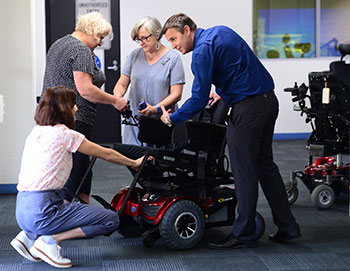
The EnableNSW clinical team will be recommencing some face-to-face prescriber education sessions in 2024.
These sessions will initially focus on categories where hands on time with the equipment will greatly enhance the learning opportunities for clinicians, including seated mobility and beds and pressure mattresses.
This is a great opportunity for clinicians to review the EnableNSW stock equipment range, and following attendance to any prescriber education session, clinicians will be provided with a certificate of attendance and can attribute these hours towards their continuing professional development.
Face-to-face sessions will run from the EnableNSW Equipment Centre in Homebush West. Details of each session and instructions on how to book are available on the EnableNSW prescriber education page.
Invitation to join one of our technical working groups

In the coming months, clinicians in the areas of seated mobility and respiratory will be invited to express their interest in joining a technical working group (TWG) to review the relevant equipment funding criteria in their area of expertise. This is a unique opportunity to collaborate with the EnableNSW clinical team and review the existing funding criteria documents based on clinical expertise, best practice and the current evidence base.
For the seated mobility TWG, occupational therapists and physiotherapists with specific skills in powered and manual wheelchair, seating assessment, and equipment prescription will be invited to join.
For the suction units, electrical humidification and respiratory consumables TWG, expert paediatric and adult clinicians (e.g. medical, nursing, physiotherapy and speech pathology) working in the areas of respiratory/sleep medicine, spinal cord injury, ENT, head and neck, ICU and community care with complex needs will be invited to share their knowledge and expertise.
Correspondence will be sent to Chief Executives by the end of this year, seeking nominations from each Local Health District, to commence meetings in the new year.
Patient satisfaction with the IPTAAS at an all-time high

With a greater emphasis on rural and regional health, the timing of the NSW Health Isolated Patients Travel and Accommodation Assistance Scheme (IPTAAS) community awareness survey and patient survey results could not be more valuable.
Collectively, the two surveys sought to better understand patient and carer experience, impact of recent eligibility changes and general awareness of the scheme. Key findings from the surveys identified that almost 80% of those interviewed expressed satisfaction in using the scheme, while 90% indicated their willingness to utilise the scheme and recommend it to others.
The surveys also highlighted the need for greater awareness about the IPTAAS, particularly in medical centres, hospitals and health service centres.
IPTAAS statewide manager Dijana Angeleski was extremely pleased with the results and was quick to praise the IPTAAS customer service team for their efforts in helping to drive up patient satisfaction.
‘The team continue to perform so well in this space because they know that someone on the other end of an email or call is in a really desperate situation, and need all the kindness, compassion and guidance they can get’
‘We receive many emails and calls from grateful patients and carer’s who simply want to say thank you to our teams for going above and beyond and helping to reduce the administration burden’.
IPTAAS is a statewide scheme that provides financial assistance for people who need to travel long distances for specialised treatment that is not available locally. More information about this important scheme can be found on the IPTAAS website.
Going circular means helping more people
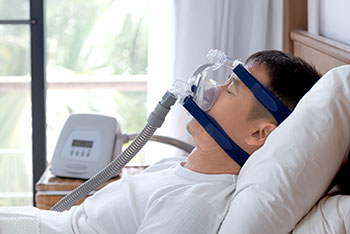
The EnableNSW team was recently awarded a funding grant from the NSW Health Sustainable Futures Innovation Fund, Climate Risk and Net Zero Unit. The Going Circular Project, led by Dr Carly Hollier, expands on EnableNSW’s existing sustainable equipment model by focusing on re-issuing returned respiratory equipment (CPAP machines and bi-level ventilators) to reduce waste and carbon emissions.
‘Re-issuing equipment that is in good working order, is one of the most effective ways we can reduce our environmental footprint,’ said Dr Carly Hollier.
‘It allows us to provide equipment to more customers in a timely manner and provide value-for-money healthcare’.
The project has helped the team identify and address key barriers that prevent routine re-issue of respiratory devices. One of the key challenges has been the need to work with a supplier to clean, refurbish and set up the equipment before it is allocated to the next person.
Partnering with the Clinical Excellence Commission and clinical experts from Sydney Local Health District and South Western Sydney Local Health District, the team have developed and implemented best-practice procedures and quality standards to clean and refurbish returned respiratory devices. The team are also partnering with a respiratory equipment supplier to pilot the processes and standards.
‘Beyond the pilot, we aim to develop a circular economy model to reduce waste and environmental footprint, while actively increasing the rates of equipment being returned when it is no longer needed.’
Clinicians are encouraged to contact EnableNSW to arrange collection of equipment that is no longer being used by the person.
The Equipment Loan Pool project: a strategic success
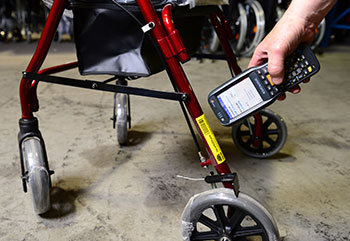
Following the success of the EnableNSW Equipment Loan Pool (ELP) pilot in two Local Health Districts (LHD) earlier this year, a third LHD ELP has joined the pilot to determine if the existing EnableNSW IT system can be successfully used by other ELPs to loan and track equipment statewide.
‘Since we commenced the pilot in 2022, we have made really important findings that have helped us refine our processes, determine where we can save clinical time, and improve the user experience,’ said Greg Foreman, Senior Project Lead.
‘This was especially helpful for the third pilot site, because we were able to leverage all learnings and complete a smooth and final roll out of the system, giving us a good indication of what this could look like statewide’.
The team will now seek executive endorsement for the rollout of the EnableNSW IT system state-wide.
'When we set out in 2020 to define our strategic priorities, we committed to ensuring quality assistive technology is readily available for clinicians in their own ELPs, so that people could safely discharge from hospital,’ said Jackie Hiller, manager EnableNSW
‘Fast forward almost four years and we have successfully piloted out GMAT IT system in 3 LHDs to show the value and power of a centralised system that could intelligently support the health system. I could not be prouder of the teams and their collaborative efforts with all our stakeholders’.

